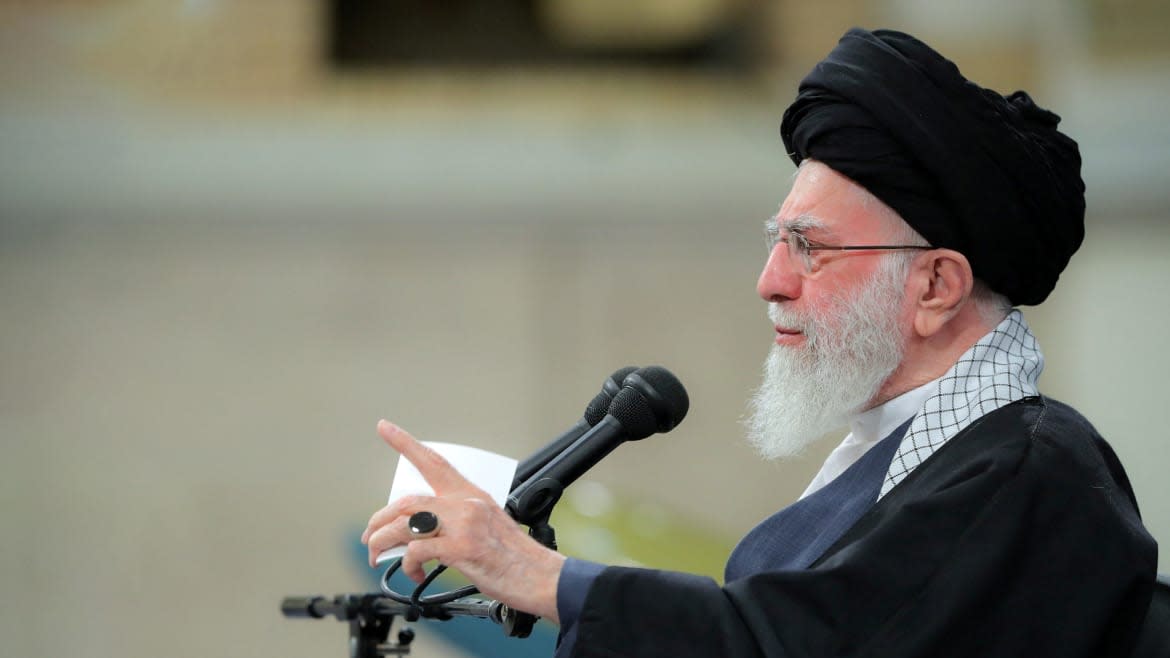Iran Issues Unprecedented Nuclear Threat in Duel With Israel

Iran warned on Thursday that it might review its nuclear “doctrine,” threatening a potential break from the publicly stated “peaceful” objectives of its nuclear program.
“The threats of the Zionist regime [Israel] against Iran's nuclear facilities make it possible to review our nuclear doctrine and deviate from our previous considerations,” said Ahmad Haghtalab, a top Iranian Revolutionary Guards commander, according to Tasnim. “If the Zionist regime wants to take action against our nuclear centers and facilities, we will surely and categorically reciprocate with advanced missiles against their own nuclear sites,” Haghtalab said, adding the era of “hit and run" is over.
The threat to change course comes as Israel has been deliberating a response to Iran’s attack on April 13, when Tehran launched over 300 missiles and drones towards Israel. The attack—conducted in retaliation for the killing of a top commander at an Iranian embassy in Syria earlier this month—was largely thwarted, causing no major damage in Israel.
Israeli officials have vowed to respond, but offered no further details, fueling fears about an all-out war erupting in the region.
The Israeli government was previously weighing whether to target Iranian nuclear sites in response to an attack by Tehran, according to earlier reporting from London-based Elaph.
Israel Vows to Punish Iran as Spiral of Vengeance Deepens
U.S. officials and other allies have been urging Israel to temper its response to Iran’s attack last weekend. Netanyahu has stalled the retaliation in reaction to the mounting pressure, according to Kan.
In particular, Iran uses its nuclear program to build “negotiating leverage” in the face of “perceived international pressure,” according to a U.S. intelligence memo released in February. The memo assessed that in the face of attacks, Iran could seek to enrich uranium up to 90 percent.
Tehran has long insisted that its nuclear program is intended for peaceful purposes, such as power generation or research. Although such threats are rare, Iran’s intelligence minister, Mahmoud Alavi, said in 2021 that Western sanctions could force Iran to develop nuclear weapons.
“If they push Iran in that direction, then it wouldn’t be Iran’s fault but those who pushed it,” Alavi said at the time. “If a cat is cornered, it may show a kind of behavior that a free cat would not.”
A religious edict from Supreme Leader Ayatollah Ali Khamenei states that pursuing nuclear weapons is forbidden.
“Building and stockpiling nuclear bombs is wrong,” Khamenei stated in 2019.
Efforts to revive the Iran nuclear deal—which restricted Iran’s nuclear program in exchange for relief from sanctions—have been stalled since 2018, when then-president Donald Trump abandoned the deal. As of February, Iran was continuing to enrich uranium up to 60 percent purity, according to the chief of the International Atomic Energy Agency, Rafael Grossi. Those levels are close to weapons grade and are far above commercial nuclear use, Grossi said.
As of late January, Iran was not undertaking “the key nuclear weapons-development activities” that are “necessary” to produce a testable nuclear device, according to a U.S. intelligence assessment.
Last March, General Mark Milley, then the Chairman of the Joint Chiefs of Staff, told members of Congress that Iran could pursue weaponization over a matter of months.
Get the Daily Beast's biggest scoops and scandals delivered right to your inbox. Sign up now.
Stay informed and gain unlimited access to the Daily Beast's unmatched reporting. Subscribe now.


